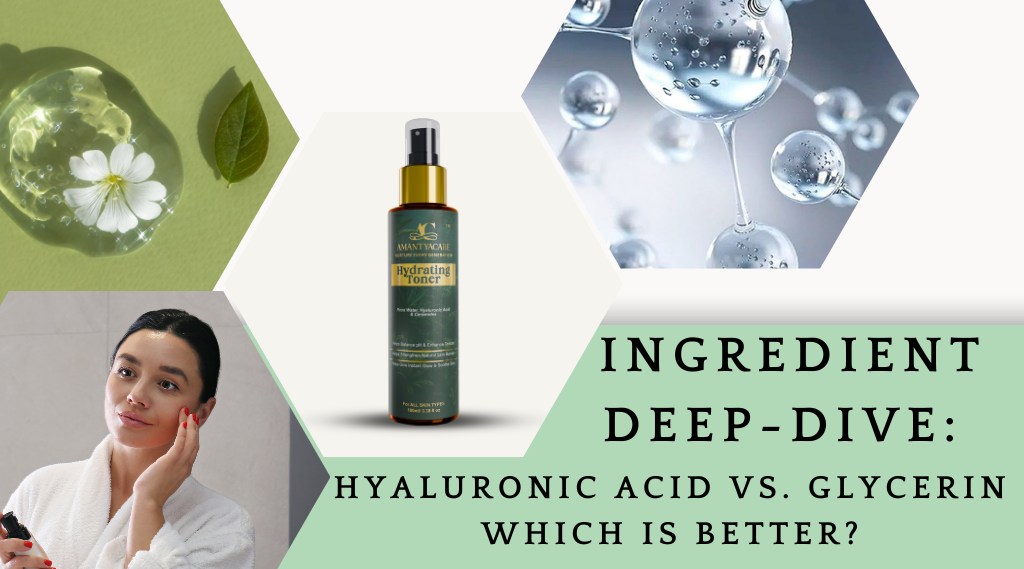
Ingredient Deep-Dive: Hyaluronic Acid vs. Glycerin – Which is Better?
When it comes to skincare, hydration is the key to plump, radiant, and healthy skin. Two of the most celebrated hydrating ingredients are Hyaluronic Acid (HA) and Glycerin. While both are humectants (ingredients that draw moisture into the skin), they work in unique ways and have different benefits. Let’s break it down and see which one deserves the crown in the world of hydration.
Understanding Hyaluronic Acid and Glycerin
What is Hyaluronic Acid?
Hyaluronic Acid is a naturally occurring molecule in our skin that can hold up to 1,000 times its weight in water. This makes it an exceptional moisture magnet, helping the skin stay hydrated, smooth, and youthful. Over time, our natural HA levels decrease, leading to dryness and fine lines—hence, the importance of topical HA in skincare.
How Hyaluronic Acid Works
Hyaluronic Acid works by attracting and binding water molecules to the skin. It draws moisture from the environment and deeper layers of the skin, ensuring long-lasting hydration. Unlike traditional moisturizers that sit on the surface, HA penetrates the skin and helps replenish hydration levels from within.
Benefits of Hyaluronic Acid:
- Deep hydration for long-lasting moisture.
- Helps plump the skin, reducing the appearance of fine lines.
- Works well across all skin types, including oily and sensitive skin.
- Strengthens the skin barrier and protects against environmental stressors.
- Reduces redness and irritation caused by dehydration.
- Helps in faster wound healing and improves skin elasticity.
What is Glycerin?
Glycerin is another powerful humectant found in skincare. It pulls moisture from the environment into the skin, keeping it soft and hydrated. Unlike HA, glycerin is a smaller molecule, allowing it to penetrate deeply and provide intense moisture.
How Glycerin Works
Glycerin forms a protective layer on the skin’s surface while pulling in moisture from both the environment and deeper layers of the skin. It is often found in cleansers, creams, and serums, ensuring a long-lasting hydrating effect without feeling heavy.
Benefits of Glycerin:
- Provides immediate hydration to the skin.
- Helps heal and repair dry, flaky skin.
- Strengthens the skin’s moisture barrier to prevent water loss.
- Works well for people with extremely dry or dehydrated skin.
- Soothes irritated or sensitive skin, reducing redness and inflammation.
- Helps other skincare ingredients penetrate deeper into the skin.
Hyaluronic Acid vs. Glycerin: The Hydration Battle
|
Feature |
Hyaluronic Acid |
Glycerin |
|
Molecular Size |
Larger (stays on the surface) |
Smaller (penetrates deeper) |
|
Moisture Retention |
Holds 1000x its weight in water |
Draws moisture from air & deeper layers |
|
Skin Type |
All, including oily and sensitive |
Best for dry, dehydrated skin |
|
Barrier Protection |
Strengthens & protects |
Strengthens & prevents water loss |
|
Anti-Aging Benefits |
Reduces fine lines & plumps |
Prevents dryness-induced aging |
|
Best Used In |
Serums, toners, moisturizers |
Cleansers, creams, body lotions |
Which One Should You Choose?
If your skin is oily, acne-prone, or needs lightweight hydration, Hyaluronic Acid is the best pick. It hydrates without clogging pores and keeps your skin looking fresh and plump. If your skin is extremely dry or prone to flakiness, Glycerin will be your best friend as it penetrates deeper and provides lasting moisture.
The Perfect Pair: Why Not Use Both?
Many modern skincare formulations combine HA and Glycerin for a balanced hydration approach. By working together, they provide deep hydration while locking in moisture for long-lasting benefits.
Amantyacare’s Hydrating Toner: Your Best Hydration Companion
One of the best ways to incorporate Hyaluronic Acid into your routine is with Amantyacare’s Hydrating Toner. This unique formulation blends Damascena Rose, Hyaluronic Acid, and Ceramides to give your skin:
- Intense hydration without heaviness
- A soothing, calming effect for irritated skin
- Strengthened skin barrier for long-term moisture retention
This toner is designed to deliver instant hydration while also supporting skin barrier health. The presence of Damascena Rose provides an antioxidant boost, while Ceramides help maintain a strong skin barrier against environmental damage.
How to Incorporate HA & Glycerin in Your Skincare Routine
Step 1: Start with a Hydrating Cleanser
Look for a gentle cleanser infused with glycerin to keep your skin hydrated while cleansing away dirt and oil.
Step 2: Apply a Hydrating Toner
Using a toner like Amantyacare’s Hydrating Toner helps prep your skin with lightweight hydration before applying serums.
Step 3: Use a Hyaluronic Acid Serum
After toning, apply a serum with HA to deeply hydrate and plump your skin. Ensure your skin is slightly damp before applying for best results.
Step 4: Lock in Moisture with a Gel-Based Moisturizer
To prevent moisture loss, finish with a moisturizer containing Aloe Vera. This helps seal hydration into the skin.
Final Verdict: Who Wins the Hydration Battle?
Both Hyaluronic Acid and Glycerin are hydration powerhouses with unique benefits. The best choice depends on your skin type and needs:
- If you want plumping, lightweight hydration, go for Hyaluronic Acid.
- If you need intense moisture for dry skin, Glycerin is your best bet.
- And if you want the best of both? Look for products that contain both for a hydration boost that leaves your skin glowing!
Your Skincare, Your Choice
At the end of the day, hydration is non-negotiable. Whether you prefer Hyaluronic Acid, Glycerin, or both, what matters is finding the right balance for your skin’s needs.
What’s your go-to hydration hero—Hyaluronic Acid or Glycerin? Drop a comment below and let us know!
